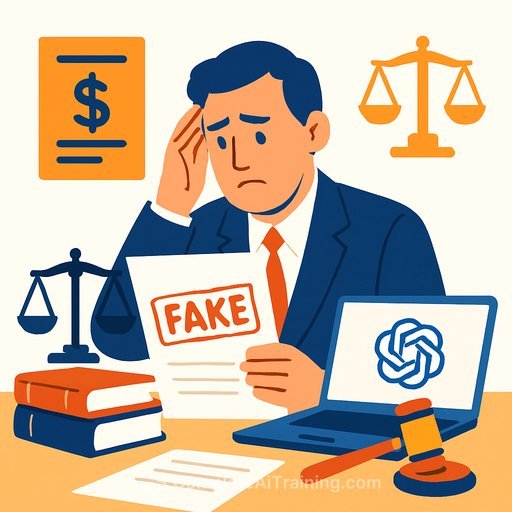California appellate court fines attorney $10,000 for AI-fabricated citations
A California appellate panel fined Los Angeles attorney Amir Mostafavi $10,000 after finding that 21 of 23 quotations in his opening brief were fabricated by ChatGPT. The court called out the conduct as frivolous and a waste of judicial resources, and issued the opinion "as a warning."
"No brief, pleading, motion, or any other paper filed in any court should contain any citations … that the attorney responsible has not personally read and verified."
What happened
The 2nd District Court of Appeal issued its opinion on Sept. 12. Mostafavi acknowledged using ChatGPT to "improve" his July 2023 appeal and admitted he did not read the AI-generated text before filing.
The panel sanctioned him for filing a frivolous appeal, violating court rules, citing fake authority, and wasting court and taxpayer resources.
Why this matters for practicing lawyers
Sanctions for AI hallucinations are spreading. In May, a federal judge in California ordered two firms to pay $31,100 for "bogus AI-generated research." Trackers have identified 50+ incidents in California and 600+ nationwide, with new cases reported daily.
Researchers report a high hallucination rate across popular tools. A Stanford RegLab analysis found some AI systems produce hallucinations in roughly one in three queries, while most lawyers plan to use these tools. As models get larger, detecting fabrications gets harder.
Regulatory pressure is building
- The Judicial Council of California directed courts to either prohibit generative AI or adopt a use policy by Dec. 15. Judicial Council of California
- The State Bar is weighing updates to professional conduct rules to address AI.
What experts are seeing
- "The harder your legal argument is to make, the more the model will tend to hallucinate." - Damien Charlotin
- "We'd see a reduction if lawyers understood the basics of the technology." - Jenny Wondracek
- Fines are appropriate for "an abdication of your responsibility as a party representing someone." - Mark McKenna
- New grads and clerks are being told to use AI or get left behind, without guardrails. - Andrew Selbst
Use AI, but with a discipline that survives court scrutiny
AI can help with outlines, brainstorming, formatting, and plain-language edits. It cannot be trusted for legal authority. Treat every AI citation as a lead that must be independently verified or discarded.
Immediate steps for litigators and appellate teams
- Verification protocol: Every citation is checked in an authoritative source (official reporter, Westlaw, Lexis) and read end-to-end. Confirm jurisdiction, procedural posture, direct quotes, signals, and subsequent history.
- Quote-checking: Match quoted language to the reporter. Add pincites. Remove anything you cannot confirm.
- Source control: Disable auto-citation features in AI tools. If AI suggests authority, mark it "unverified" until validated.
- Role assignment: Designate a "citation captain" for each filing who certifies verification is complete.
- Audit trail: Keep a short log of who verified what and when, with links or PDFs of cited cases.
- Confidentiality: Do not paste client secrets into public models. Check vendor data retention and training policies.
- Training: Give juniors and staff a one-hour baseline on AI risks, hallucinations, and verification basics.
Draft a firmwide AI policy that aligns with court expectations
- Scope and tools: Approved tools, prohibited tools, and required settings.
- Permitted uses: Summaries, style edits, outlines, checklists. Ban AI-generated citations and quotes unless independently verified.
- Citation rule: No authority appears in a filing unless a licensed attorney has read the source.
- Logging: Maintain prompts and outputs used in drafting for internal QA; do not file them unless required.
- Client consent: When AI is materially used, consider disclosure in engagement letters.
- Ethics and sanctions: Tie the policy to Rule 11 analogs, duty of candor, confidentiality, and local standing orders.
Pre-filing checklist (use it every time)
- All cases verified in a trusted database and read in full
- Quotes match reporter; pincites included
- Jurisdiction and subsequent history checked
- No AI-generated text included without human review
- Partner or lead counsel sign-off recorded
Bottom line
Courts are done giving warnings. If AI touches your drafting, you own the result. Verify everything or expect sanctions.
- Stanford RegLab: research and updates on AI performance and hallucinations
- Practical prompt-engineering resources to train teams to keep AI outputs verifiable
Your membership also unlocks:






